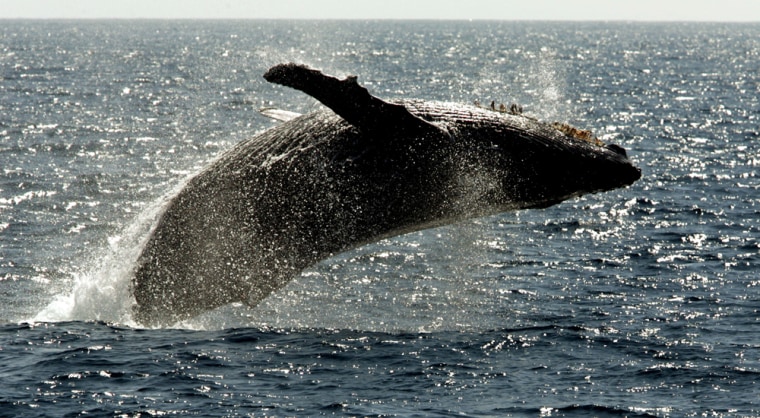Nations that oppose whale hunting thwarted a bid by Greenland on Thursday to raise its annual aboriginal hunting quota by 10 humpbacks, deeply polarizing pro- and anti-whaling lobbies.
Member nations at the annual International Whaling Commission meeting in Santiago voted against the proposal, despite the fact that the body's scientific committee endorsed it, with some countries unconvinced that Greenland's aboriginal population needs more whale meat.
A moratorium on commercial whaling was introduced in 1986, but Japan continues to catch hundreds of whales each year, citing scientific research, while Norway and Iceland continue to hunt whales in defiance of the non-binding ban.
Aboriginals in Greenland, Russia and Alaska are granted special concessions to continue catching whales for subsistence purposes, and conservationists say they are concerned by claims that some whale meat is being sold commercially in Greenland supermarkets.
"Greenland's claims that its aboriginal subsistence whaling is not commercial is an absolute sham," Wendy Elliott, a zoologist who manages the species program of global conservation organization WWF, told Reuters after the vote.
"Greenland does not need any more whales. Greenland's not even using the full quotas that it has."
Humpback whales are considered a vulnerable species by the International Union for Conservation of Nature. Global whale stock data is patchy, and much of it outdated, but the whaling commission estimates there are around 65,000 humpback whales in the western and northern Atlantic, Southern Hemisphere and Pacific.
Greenland already has an IWC quota to catch 212 minke whales, 19 fin whales and 2 bowhead whales each year, but says they are not enough.
Muscle-flexing exercise?
Some saw Greenland's bid as a muscle-flexing exercise by pro-whaling nations spearheaded by world No. 1 whaler Japan, Norway and Iceland at the meeting, which had steered clear of confrontational issues until Thursday.
"We are extremely relieved to know that the humpback whales are safe from hunting in European waters," said Sue Fisher of the Whale and Dolphin Conservation Society.
"The adoption of this flawed proposal from Greenland would have set a terrible precedent for allowing commercial elements in aboriginal subsistence hunting."
Greenland, which is a self-governing province of Denmark, has vowed to push for the quota increase again next year.
The vote result drew angry responses from a host of nations who back whaling -- including by some nations which don't even hunt whales themselves.
"We are in the middle of a world food crisis," said Daven Joseph, assistant commissioner for St. Kitts and Nevis in the Caribbean, which does not catch whales. "The people of Greenland have very little as far as sustenance is concerned."
"I do believe the vote against Greenland pursuing the hunt for the 10 humpback whales is a violation of the human rights of the people of Greenland," he added, accusing the no camp of voting on emotional and political grounds, taking a "colonial posture" and of using food as a weapon.
